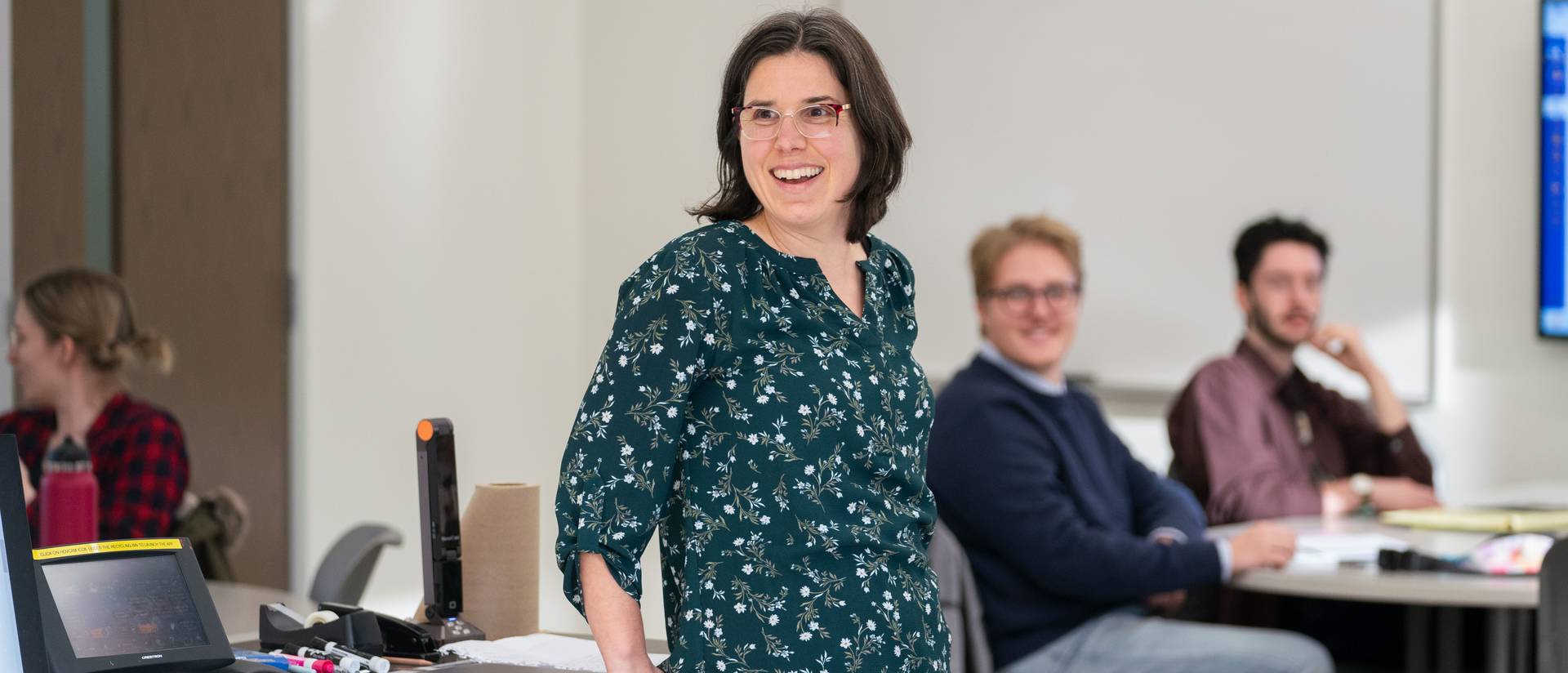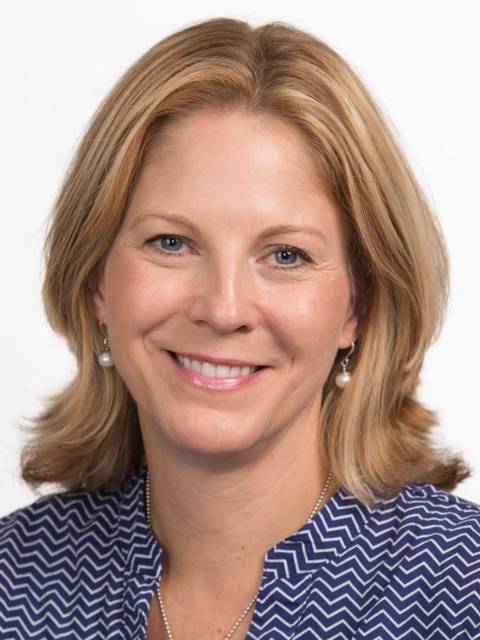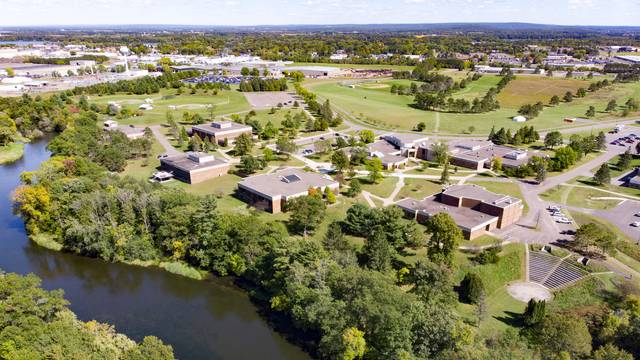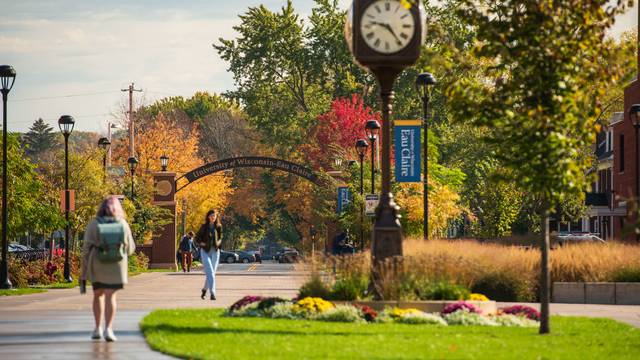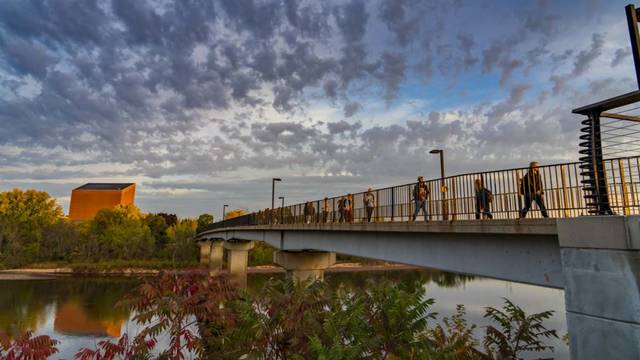Photo caption: Dr. Jessica Miller says that conversations in her French language classes are meant to meet her students where they are in learning and that mistakes are an important part of the process.
Dr. Jessica Miller, professor of French at the University of Wisconsin-Eau Claire, has been named the 2024 Teacher of the Year by the Wisconsin Association For Language Teachers.
Head of the French section of the languages department, Miller has been teaching all levels of French at UW-Eau Claire since 2006 and has been a nationally certified language proficiency tester since 2015. She received the Wisconsin-American Association of Teachers of French (AATF) Award of Recognition for professional dedication in 2016. Under her leadership, the UW-Eau Claire French section has been recognized twice as a National AATF Exemplary Program (2017 and 2020).
Miller earned a Ph.D. in French linguistics from the University of Illinois Urbana-Champaign. Her professional interests include second language acquisition, phonetics and oral proficiency.
“Receiving the title of Wisconsin Language Teacher of the Year is an immense honor. At the annual meeting in early November, my peers recognized me as someone who makes a positive impact in the field of language teaching,” Miller says.
“It was an amazing moment for two reasons. First, to be in a room with colleagues at all different stages of their careers was both humbling and uplifting. I felt that I was truly part of a supportive team dedicated to education. Second, I felt energized because I still have much to learn from this team. This award confirms my long-term commitment to the teaching profession.”
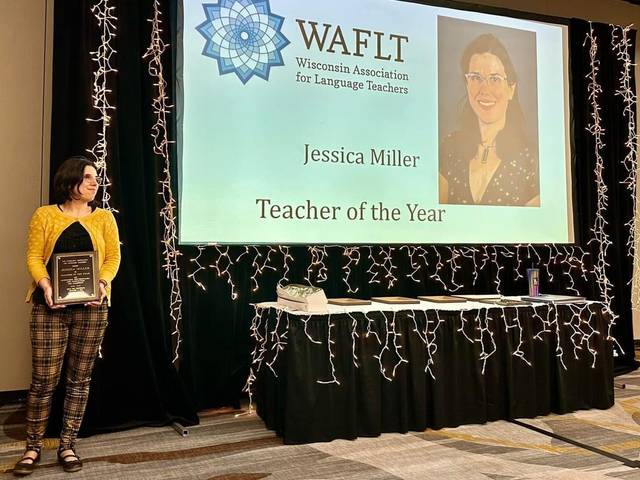
We met up with Miller to congratulate her on this recognition and to learn more about her career path and about being part of this campus and community.
What led you to get into teaching? Tell us about your path.
I grew up in Strasbourg, France, and was always interested in languages. By the time I was in high school, I had learned German, English and Spanish. In college, I majored in English and started a part-time job teaching English to children. It was a rough learning curve, as I had never taught before and received little training. At that point I didn’t think the teaching profession was for me. During my second year at the University of Strasbourg, I applied to study abroad for one year in the U.S. and was accepted into the program, and I’ve been living in the U.S. ever since. I was able to complete my English degree with my hometown’s university while in the U.S. and started grad school with an assistantship right away at Saint Louis University. I became a teaching assistant and thus began my teaching career. After obtaining a master’s degree, I continued with a Ph.D. at the University of Illinois Urbana-Champaign. There, my teaching responsibilities increased, as did my training in second language acquisition, along with my interest in language education. Students seemed to find my classes helpful and enjoyable, and I found motivation in creating effective lesson plans that incorporated my home culture.
What’s one thing you want every student coming into your classes to know about you?
I would like them to know that I’ve faced, and continue to face, the same challenges they’re experiencing as language learners. Speaking a language that is not your native language is difficult and intimidating. You can never be in full control of what you say, how your words might be interpreted, how listeners will perceive you. I’ve made my share of embarrassing mistakes! I want my students to know that I understand firsthand this fear of making mistakes, and I want to help them overcome this obstacle to proficiency development.
What is something you’ve worked on at UW-Eau Claire that you’re especially passionate about?
I’ve been very interested in universal design for learning lately and have done my best to apply the principles of this framework to my teaching. My goal is to create inclusive and accessible learning experiences to address the needs of all students. For example, I pay attention to how I present information in class and on Canvas so that students have easy access to everything they need to succeed. Because I was a first-generation, low-income college student myself and did not always understand unwritten rules of higher education, I feel passionate about making success in my classes within everyone’s reach.
What do you enjoy most about being part of the UW-Eau Claire community?
The UW-Eau Claire community seems to be just the right size. Not too big for someone to get lost in a crowd, but not too small to get bored. I love to run into familiar faces on and off campus, and I admit I cannot stop myself from speaking French to my students when I spot them “in the wild”! The size of our community makes it friendly, but so do our campus’ efforts toward inclusivity. I enjoy meeting students with varied backgrounds, vibrant identities and aspirations of all kinds.
What do you find to be the most unique aspect of teaching language? What brings the most reward to your work?
Something I believe is distinctive about teaching language is the way we get to know our students from the start of working together in class. Learning a language is all about communication and meeting the learners where they are in acquiring that language. It starts with beginners, and communication is all about the self. We learn first in ways to talk about ourselves in very basic terms. Then at the intermediate level, the bubble of content expands to include not just the self, but also families and communities. At the highest levels, language learners can use their skills to exchange much more abstract ideas. From the start of our interactions, we are learning about one another on personal levels, which I don't think is quite the case in all disciplines.
If you hadn’t become a faculty member, what might you be doing for a living?
When I was in college, I considered becoming a translator and was especially interested in film subtitles because I loved British cinema. My hometown is also one of the three European capitals and home of the European Parliament, where about 700 translators work, so that would have been another option.
When you’re not on campus, where in Eau Claire is your favorite spot to be?
I love the parks and trails around Eau Claire and enjoy biking and walking around town. I live on the Eastside Hill where I help maintain the prairie at Boyd Park with a small group of dedicated nature enthusiasts. We mostly plant natives and remove invasives. Behind the prairie there is a wooded area that is one of my favorite spots. A narrow trail meanders above the Eau Claire River. It is so peaceful and pretty. The atmosphere changes through the seasons, each one bringing new visual interest.
What was the last book you read outside of your academic reading? Would you recommend it?
“La fille dans l’écran” by Manon Desveaux and Lou Lubie, is a French graphic novel about two young women who become friends via email. One lives in Canada and the other lives in France. They both must make life-changing decisions and help each other out despite the distance. I recommend it not only because the story is engaging and the illustrations beautiful, but especially because it emphasizes the power of cooperation. The authors each illustrated a different character. As a result, two distinct drawing styles eventually meld together in harmony. It made me think of French teachers. We can feel isolated at times because we can’t easily cooperate with colleagues on campus since we teach in French. This book reminded me of my successful collaborations with other language teachers in and outside of Wisconsin, as far as South Korea.
